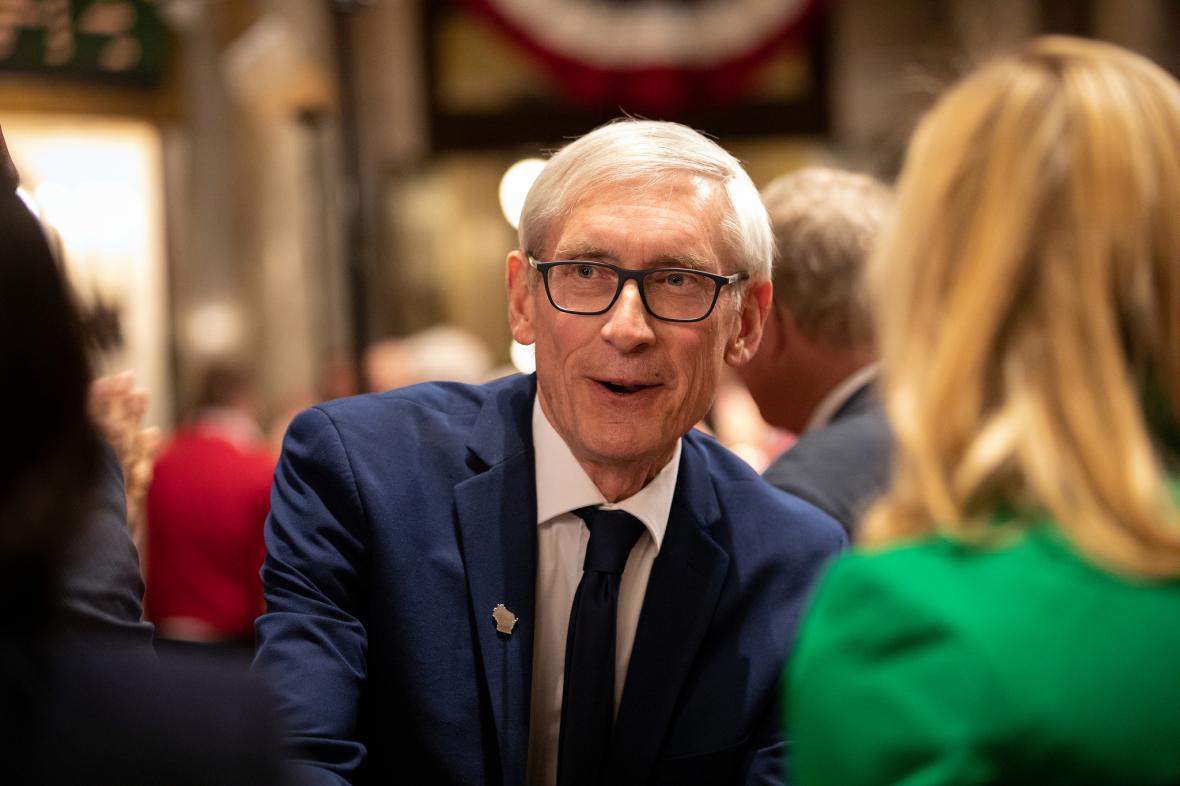10 Issues to Watch in Evers Budget
Yes, it will be different than a Walker budget. But precisely how?

Gov. Tony Evers greets members of the Assembly and Senate after giving his first State of the State address in Madison, Wisconsin, at the state Capitol building on Jan. 22, 2019. Photo by Emily Hamer/Wisconsin Center for Investigative Journalism.
A “Plymouth Progressive”.
That’s what Democratic candidate for governor Tony Evers has called himself. He grew up in Plymouth (Sheboygan County), population 8,400, and his Progressive politics are left of moderate.
Thursday, Gov. Evers will give Republicans who control the Legislature a 2019-21 budget that looks nothing like the four offered by GOP Gov. Scott Walker.
Here are 10 things to look for in that budget. Use your political beliefs to score the Democrat’s plan.
1: Restore collective bargaining?
How much of 2011’s controversial Act 10, which cost teachers and other public employees (except firefighters and police officers) the right to unionize and negotiate collectively, will Evers seek to restore?
Act 10 contributed to the drop in the number of Wisconsin workers who belong to unions – from 14.2 percent in 2010 to 8.1 percent in 2018.
Act 10 also required public employees to pay much more for health care and pensions. But asking that they pay less for those benefits seems like a bridge too far for even the Progressive Evers to try and cross.
2: Repeal “right to work” law?
In 2015, Walker and Republican legislators added Wisconsin to the list of states that prohibit private-sector unions from forcing members to pay dues. That attack on private-sector unions, and repealing the “prevailing wage” law that specified minimum pay on some public projects, had unions – although much less powerful than in 2010 – leading the fight to elect Evers.
What pro-union proposals, if any, will he propose?
Evers has said he wants to decriminalize possession of less than 25 grams of marijuana, pardon inmates who pose no public safety threat, and expunge minor marijuana possession convictions from an individual’s criminal record. Walker pardoned no one, and did not visit any prisons, in eight years as governor.
Evers said his changes would start to fix a criminal justice system that leads the nation in putting African-Americans in prison.
Bottom-line question: Will the new governor’s reforms allow him to seek the closing of one of the state’s overcrowded adult prisons by mid-2021?
4: “Red flag” law?
Attorney General Josh Kaul wants Evers to include a “red flag” law, which would lay out a procedure for guns to be temporarily taken away from someone found to pose a threat to others.
Evers is likely to include that proposal. But how would it work?
5: How big a gas tax increase?
Evers has signaled that his budget will raise the 30.9-cent per gallon gas tax to help close the highway funding shortfall. A 5-cent jump would raise $165 million per year. The gas tax was last raised in 2006.
6: How big a hike in minimum wage?
Evers told reporters his budget would raise Wisconsin’s $7.25 per hour minimum wage, last increased (by 75-cents) in 2008.
He will not try to immediately raise it to $15 per hour, which some local governments nationally have adopted. But what specific increase will his budget seek, when would it kick in, and will he include a “ladder” proposal that ultimately raises it to $15?
7: Freeze – or dial back – School Choice?
As state superintendent of public instruction, the job he gave up to become governor, Evers opposed the School Choice program that allows students to attend private schools at state expense.
School Choice is projected to cost $238.1 million in 2020-21 – a 24.5 percent increase in just two years.
Evers has repeatedly promised to not try and end School Choice in his first budget. But he has other options – freezing it at this year’s price tag of $191.1 million, which he’s said his budget will include, along with a suspension in any new independent charter schools until 2023.
8: Repeal of GOP limits on abortions?
Walker and Republican legislators enacted several changes since 2011 making it harder to obtain an abortion. Will Evers seek to repeal any of those laws, in addition to restoring state funds for Planned Parenthood?
9: New renewable energy standard?
Wisconsin’s 10 percent renewable energy standard hasn’t been updated since 2006. Evers has said he wants a new goal to help fight global “climate change” – a term Walker’s aides had banned.
10: New revenue options for local governments?
If Evers thinks counties, cities, towns and villages lack power to raise money for critical local services, and state government can’t give them more cash, will his budget give them new tools?
Your turn. Use these benchmarks to score the budget Evers offers Thursday.
Steven Walters is a senior producer for the nonprofit public affairs channel WisconsinEye. Contact him
More about the 2019-2021 Wisconsin Budget
- State Budget Fell Short on Highways? - Laurel White - Jul 8th, 2019
- Rep. LaKeshia Myers Supports Governor Evers’ Partial Vetoes - State Rep. LaKeshia Myers - Jul 3rd, 2019
- Statement: Wisconsin’s biennial budget will speed up transition to electric vehicles and improve public transit - WISPIRG Foundation - Jul 3rd, 2019
- Majority Leader Fitzgerald Reacts to Governor Evers Signing the Wisconsin Budget - U.S. Rep. Scott Fitzgerald - Jul 3rd, 2019
- Evers Uses 78 Partial Vetoes on Budget - Laurel White - Jul 3rd, 2019
- Rep. Bowen Statement on Gov. Evers’ Signing of Biennial Budget - State Rep. David Bowen - Jul 3rd, 2019
- Promises Made, Promises Kept: Gov. Evers Signs Wisconsin’s 2019-21 Biennial Budget into Law - Gov. Tony Evers - Jul 3rd, 2019
- Budget Bill The Shortest in Decades - Shawn Johnson - Jun 30th, 2019
- Op Ed: Budget Should Plan For the Future - State Sen. Jennifer Shilling - Jun 29th, 2019
- Majority Leader Fitzgerald Statement on the Passage of the Wisconsin Budget - U.S. Rep. Scott Fitzgerald - Jun 26th, 2019
Read more about 2019-2021 Wisconsin Budget here
The State of Politics
-
A Wisconsin Political Trivia Quiz
 Dec 15th, 2025 by Steven Walters
Dec 15th, 2025 by Steven Walters
-
The Fight Over Wisconsin’s House Districts
 Dec 8th, 2025 by Steven Walters
Dec 8th, 2025 by Steven Walters
-
The Battle Over On-Line Betting
 Nov 24th, 2025 by Steven Walters
Nov 24th, 2025 by Steven Walters




















